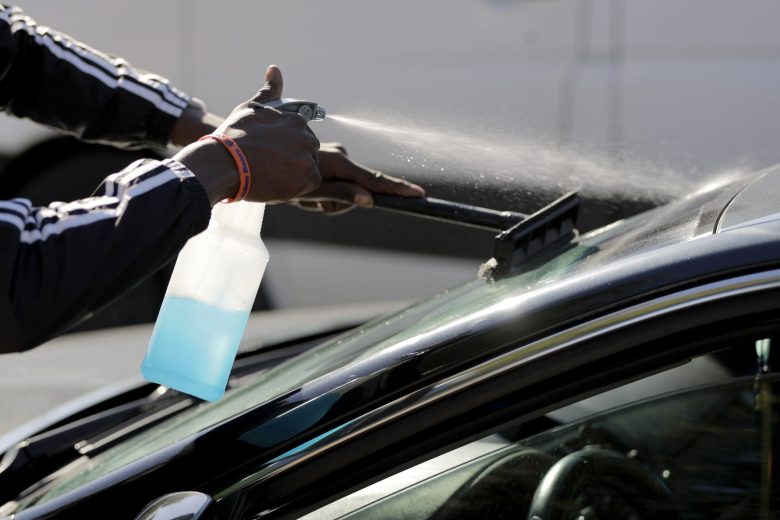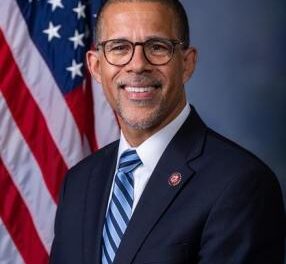By Tashi McQueen,
AFRO Political Writer,
tmcqueen@afro.com
For decades Baltimore community leaders have tried to solve the tension between squeegee workers on the corner and residents concerned about their safety.
The situation escalated last year at the Inner Harbor, when a dispute with a teen squeegee worker led to the shooting death of 48-year-old Timothy Reynolds. The homicide split emotions in the city straight down the middle, with many saying the illegal trade has become much more than a harmless nuisance– and others taking up for the youth, who say they are only doing what they can to survive.
“Where we come from, there isn’t any hope. It’s all about the murders and drugs,” said Damonte Howard, a 20-year-old ex-squeegee worker. “People don’t really know what we go through. They just see what they see on TV, but they never come up and talk to us.”
In January, Mayor Brandon M. Scott rolled out the Squeegee Collaborative, an initiative that brought more than 150 businesses, community organizations and Baltimore youth together to create remedies for the squeegee challenge in Baltimore.
“We have been enforcing our disallowed zones since January, and we have seen a lot of progress in reducing the number of calls for issues pertaining to squeegee workers. We’ve also seen the number of calls for criminal incidents involving squeegee workers reduced by over 70 percent,” said Faith Leach, chief administrative officer for the City of Baltimore. “We know that our strategy is working and that we’re having a deep impact.”
“We know that this approach, combining both accountability with opportunity, is what it will take to solve this problem for the long term,” Leach continued.
Dr. Andrey Bundley, director of the Mayor’s Office of African American Male Engagement (MOAAME), further explained the initiative.
“The collaborative is [made up of] thought partners, looking at the things we can do to stand up structures that will support young people so they won’t have to be out in the street,” said Bundley. “It’s an ongoing collaboration.”
Through the collaboration, ex-squeegee workers have access to workforce, education and entrepreneurship training.
“We wanted to move our youngsters from the corner and the need to squeegee by giving them an alternative way of attaining income,” said Bundley. “The non-school-age youth get paid every two weeks while training with us. Those who are school-age youth – the ones we find on the corners – go to school, and then after school they get the guidance they need. At the end of a 10-day cycle, they get a stipend for participating in school.”
The AFRO sat down with a few ex-squeegee workers who have greatly benefited from MOAAME and the collaborative.
“I got into squeegee working when my mother was in the hospital in 2013. Since then, I’ve been trying to survive however best I could,” said Howard. “I have little siblings that I care for, so that’s why I went out there and did what I had to do.”
Since utilizing the resources of MOAMME and other services provided through the Squeegee Collaborative, he has stopped squeegee working and is now steadily employed at a local Family Dollar store.
Leach said over 30 youths have been connected to employment or sent back to school through the collaborative.
“A friend of mine introduced me to the program,” said Howard. “At first, I didn’t want to go, but I had to think like I can’t be out there all my life. I tried it out and I’ve been with these people ever since.”
For Howard, taking care of his family remains the most important thing.

“I’ve been involved with squeegee working since I was 13,” said Justin Matthews, a 19-year-old East Baltimore native. “I started squeegeeing because I used to go to school with holes in my shoes. I didn’t want the other kids to keep laughing at me.”
Matthews recently graduated high school with the help of the collaborative, and now he desires to be a private chef.
“I want to cook for famous people,” said Matthews. “I’ve been seeing the stuff people make on Tik Tok and I wanted to make my own little recipe.”
In the meantime, Matthews said he will start a job with HoodFellas, a Black family-owned restaurant, in July.
“Right now, I’m trying to be financially stable,” said Matthews.
Howard and Matthews don’t believe squeegeeing will stop.
“From my point of view, you can’t stop it,” said Howard. “Some people don’t have that mindset to get a job where we come from. I don’t think people are really out here trying. They just want to be cool.”
“You still have young people that can’t get jobs because of their age so they come out and squeegee,” said Matthews. “They start selling waters and stuff like that and make something work.”
Leach said there will be cons, but they are not giving up on young people.
“At the beginning of this process, I was clear that we are not presenting a silver bullet to squeegeeing. We’ve been dealing with this issue for 40 years in our community,” said Leach. “If squeegee workers are out on the street, then our outreach team will be connecting with them.”
Leach said Scott has made funds available to the squeegee collaborative.
“Mayor Scott has invested $30 million into our workforce development system, so we already have job opportunities funded,” said Leach. “He also allocated one million dollars to an effort around boys and young men of color, and a portion of that is dedicated to squeegee work.”
Leach shared that a Squeegee Collaborative website will launch soon with public data.
“We will be releasing a data story map that shows the facts around squeegee workers and the progress that we’ve made,” she said. “You’ll see the hotspots, zones and if there’s been movement between areas.”
Tashi McQueen is a Report For America Corps Member.
The post An AFRO update on Mayor Scott’s Squeegee Collaborative appeared first on AFRO American Newspapers .










